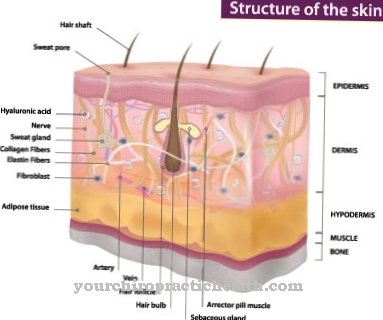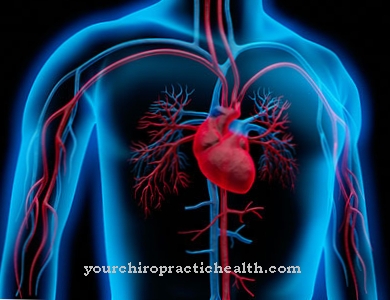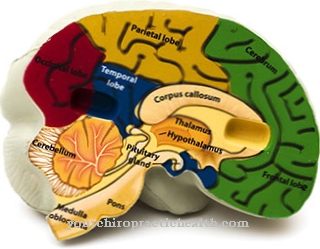For many it is simply part of puberty: the Acne vulgaris. Even if it is unavoidable in most cases, there are ways to significantly mitigate its course.
What is acne vulgaris?

Acne vulgaris is one of the most common skin diseases, as the main causes that trigger acne occur in every human organism: hormones.
In particular, it is "male" hormones, also known as androgens in medical jargon, that most commonly cause acne vulgaris. Precisely because the hormonal balance changes fundamentally during puberty, acne vulgaris occurs almost exclusively at a young age and heals by itself by the third decade of life.
According to various studies, 70 to 95 percent of all Germans had skin blemishes at one point in their life that were due to the presence of acne vulgaris, which has now healed. The typical symptoms of acne vulgaris primarily include skin blemishes and possibly scars that can be traced back to incorrect treatment by the person concerned.
causes
As already mentioned, the suddenly increased occurrence of androgens is "to blame" for acne vulgaris. It is known that these stimulate the sebum glands, which are found everywhere on the skin and especially on the skin of the face, to produce more hard fat.
On the one hand, the natural sebum is very important for the skin to keep it elastic and prevent the skin from drying out. If the natural sebum is thickened by too high a proportion of skin oil, there is a risk that the skin pores through which it exits will clog. The result is that the sebum stays under the skin and causes the pimples typical of acne vulgaris.
The bacteria belonging to the skin flora begin to feed on the skin fat. Their waste products in turn irritate the skin, which ultimately leads to inflammation of the facial skin and worsens the complexion. Hormones aren't the only possible causes, however.
It has been medically proven that the facial skin of some people - not only because of a possible intolerance - reacts to certain medications by increasing the formation of skin fat. The result is the same as in acne vulgaris caused by hormone fluctuations.
Symptoms, ailments & signs
Usually, acne vulgaris shows up in the typical reddening of the skin that occurs on the face, neck, back and cleavage. The complaints and symptoms can vary in severity. Usually there is slight inflammation, which manifests itself, for example, by itching and slight pressure pain. In severe cases, entire skin areas are affected by blackheads and pimples.
When touched or by external stimuli - for example from cotton shirts or perfume - severe pain occurs. Externally, acne vulgaris can be recognized by the typical reddening of the skin and bumps. These are often filled with pus and cause increasing tenderness over time. In the case of severe acne, the initially harmless changes in the skin can develop into lumps, abscesses and crusts.
If the pimples are scratched open, scars can remain. Depending on which areas of the body are affected, other symptoms may arise. For example, pimples in the genital area can lead to movement pain or painful abscesses that can break open inwards.
In particularly severe forms, acne vulgaris can be associated with fever. Joint inflammation and concomitant diseases can also occur if the disease is not adequately treated.
Diagnosis & course
Dermatologists can usually determine if acne vulgaris is present with a simple visual diagnosis. Nevertheless, further diagnostic measures are required to determine the exact cause and to be able to tailor treatment to it. For example, by asking the patient about recently taken medication, the doctor can determine whether medication could be to blame for the onset of acne vulgaris.
Complications
Depending on the genetic makeup and the nature of the skin, acne vulgaris can lead to considerable complications. If the sebum production is too high, the sebum glands cannot clean themselves. Pus-forming bacteria attack the area. Inflammatory and painful bumps can, in the worst case, develop into bulky lumps or boils.
If the degree of inflammation is flat, these phenomena are called carbuncle. The upper body and face are particularly badly affected. This form of acne is rarely found in the groin region or in the armpit area.
In the severity of its manifestation, acne requires accompanying medical therapy. If the medication is not taken properly, physical discomfort can occur. There is a risk of headache, swelling of the lymph nodes and sepsis. It is therefore important to have the acne triggers determined by a doctor in order to rule out side effects, for example from a peeling cure, special antibiotics or disharmonious hormone levels.
If targeted acne therapy is neglected, permanent scars can form. These can only be remedied to some extent with great cosmetic effort. External circumstances can also negatively affect the healing process of acne. Most affected by acne vulgaris are adolescents, adults rather rarely. If acne worsens, quality of life suffers, especially in adolescence. Young patients complain of bullying, depression and even suicidal thoughts during their acne therapy.
When should you go to the doctor?
Acne vulgaris does not always require medical evaluation. The pimples usually go away on their own after a few weeks or months and usually do not result in any complications. Treatment by a dermatologist is recommended if the symptoms persist for more than eight weeks or are associated with accompanying symptoms. You should speak to a doctor if you experience symptoms such as itching, pain or psychological problems.If symptoms such as fever or chills occur in addition to the acne, a practice or clinic should be visited for further clarification.
Anyone who notices a reddish streak on the skin should call an emergency doctor immediately, as there may be blood poisoning. Otherwise, acne vulgaris should be examined by a doctor as soon as scars appear or general well-being is affected. If the well-known care products and home remedies show no effect or if allergic reactions or intolerance occur, you must speak to your family doctor. Other contacts in the event of acne vulgaris are the dermatologist and, depending on the symptoms, an allergist or therapist.
Doctors & therapists in your area
Treatment & Therapy
In principle, acne vulgaris does not require treatment, as in most cases it is a temporary disease that is limited to puberty and which disappears on its own by the age of 30 at the latest.
Nevertheless, emotional stress on the patient can make it necessary to treat the symptoms. Local as well as systemic therapy options are possible. In the case of mild acne vulgaris, it is sufficient to remove the skin impurities with peeling ointments and at the same time to improve the complexion by opening the pores again. Common active ingredients of such peeling preparations are skin-softening substances such as salicylic acid, fruit acid and vitamin A creams.
In severe cases of acne vulgaris, it is necessary to treat it systemically (i.e. from within). For this purpose, the patient is given small doses of antibiotics that liquefy the skin fat so that it can flow away through the skin pores. Regardless of which treatment is chosen, therapy is tedious. The first successes in the treatment of acne vulgaris can only be seen after several weeks, if not even after several months.
Outlook & forecast
The prognosis for the most well-known form of acne is good - provided that those affected observe a few basic rules. The blackheads and pimples that occur mainly during puberty, but occasionally also in adults, are harmless in themselves. They can be successfully treated with special creams and lotions. Changing your diet to healthy whole foods with a high proportion of vegetables can also be helpful.
The outlook worsens when those affected press the pimples. This can lead to bacteria-related inflammation and purulent foci. These can reach into deeper skin layers and in the worst case leave deep craters on the skin of the face. To avoid this, an appropriate form of treatment for acne must be found.
In the case of severe acne vulgaris, the person affected should see a dermatologist. The chances for boys to keep deep crater scars are worse than for women. The inflammation may be more serious due to the beginning beard growth or for hormonal reasons. Different treatment strategies need to be found depending on the severity of the acne. Girls should not cover the affected skin areas with cosmetic make-up. A dermatologist can recommend appropriate cosmetics.
Avoidance of stress, a healthy lifestyle and mental balance ensure that acne heals a few years after puberty. In all cases, the chances of success are good.
prevention
The majority of cases of acne vulgaris are caused by hormones and so cannot be prevented. Nonetheless, there are a number of recommendations for alleviating, if not inhibiting, the progression of acne vulgaris.
The focus of all preventive measures is to keep the skin pores open, i.e. not to let them clog. This includes, for example, refraining from smoking, staying away from places with high emissions and using oily cosmetics instead of cosmetics that are water-based (e.g. light moisturizing cream). It is also advisable not to express existing pimples; not only does this not improve acne vulgaris, but it leads to scarring.
Aftercare
Aftercare is usually not required for acne vulgaris. The pimples will go away on their own as soon as treatment is started without any long-term effects. If acne vulgaris occurs during puberty, therapy is often not necessary as the pimples recede with the end of puberty and eventually subside.
Only in severe cases does follow-up care need to take place in addition to drug treatment, which can consist of anti-inflammatory ointments and light painkillers. During the follow-up checks, which can take place twice a month or every six months, depending on the severity of the condition, it is checked whether the pimples continue to subside as expected. As part of the anamnesis, the doctor will ask the patient about any side effects and adjust the medication if necessary.
If there are no complications, the frequency of follow-up checks can be gradually reduced. A six-monthly check is usually sufficient, provided that there are no unusual symptoms. However, if the symptoms recur, the doctor must be consulted. If acne vulgaris has already caused scarring, psychological support is often necessary. The patient can also turn to a self-help group and thereby overcome the psychological problems in the long term.
You can do that yourself
There are several simple ways to deal with mild to moderate acne in everyday life. Daily facial care with mild soap and water is the basis for this and should be done in the morning and evening. It is important that the hands are cleaned thoroughly beforehand.
In the case of severely inflamed pimples, zinc ointment can provide a remedy - if not already prescribed by the doctor. Thanks to its antiseptic properties, it can fight the bacteria that cause acne. A cosmetic covering of the acne is only indicated in the most necessary cases. Most cosmetic products prevent the skin from breathing, which inhibits its repair.
In the case of acne vulgaris, it is more important to ensure that no more bacteria get into the face. When doing hand movements on the face, for example for care, the hands should always be washed beforehand. A healthier diet also has a positive effect. Fats, salts and spices increase sebum production and nourish bacteria. A healthy and balanced diet is therefore recommended for a healthier complexion.
Sunlight also helps. In addition, the absorption of sunlight is ideally combined with good ventilation of the skin. With a facial steam bath, the pores can be opened and bacteria, excretions from the skin and skin flakes can then be easily washed off. There should be no rubbing of the skin here, as this only further irritates the inflammation.


.jpg)

.jpg)

.jpg)






.jpg)

.jpg)
.jpg)











.jpg)